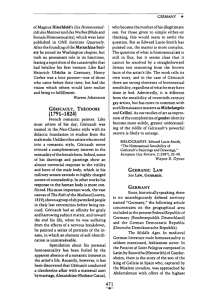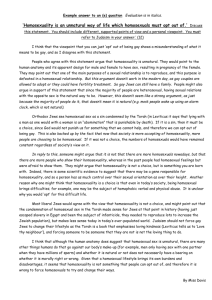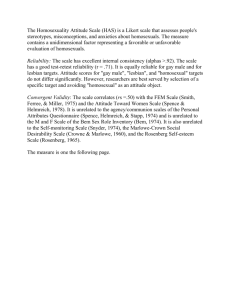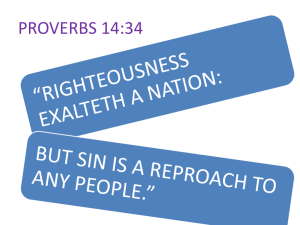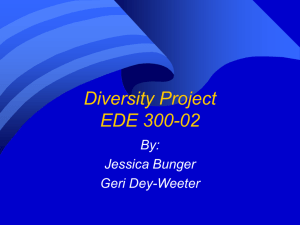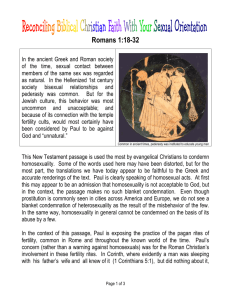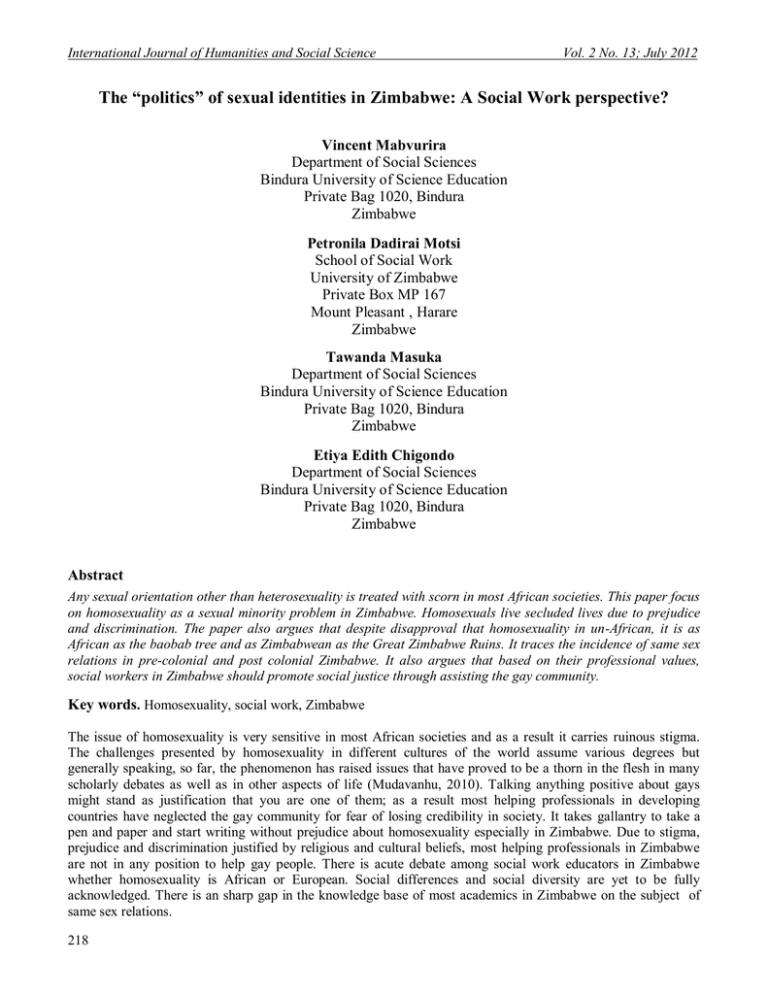
International Journal of Humanities and Social Science
Vol. 2 No. 13; July 2012
The “politics” of sexual identities in Zimbabwe: A Social Work perspective?
Vincent Mabvurira
Department of Social Sciences
Bindura University of Science Education
Private Bag 1020, Bindura
Zimbabwe
Petronila Dadirai Motsi
School of Social Work
University of Zimbabwe
Private Box MP 167
Mount Pleasant , Harare
Zimbabwe
Tawanda Masuka
Department of Social Sciences
Bindura University of Science Education
Private Bag 1020, Bindura
Zimbabwe
Etiya Edith Chigondo
Department of Social Sciences
Bindura University of Science Education
Private Bag 1020, Bindura
Zimbabwe
Abstract
Any sexual orientation other than heterosexuality is treated with scorn in most African societies. This paper focus
on homosexuality as a sexual minority problem in Zimbabwe. Homosexuals live secluded lives due to prejudice
and discrimination. The paper also argues that despite disapproval that homosexuality in un-African, it is as
African as the baobab tree and as Zimbabwean as the Great Zimbabwe Ruins. It traces the incidence of same sex
relations in pre-colonial and post colonial Zimbabwe. It also argues that based on their professional values,
social workers in Zimbabwe should promote social justice through assisting the gay community.
Key words. Homosexuality, social work, Zimbabwe
The issue of homosexuality is very sensitive in most African societies and as a result it carries ruinous stigma.
The challenges presented by homosexuality in different cultures of the world assume various degrees but
generally speaking, so far, the phenomenon has raised issues that have proved to be a thorn in the flesh in many
scholarly debates as well as in other aspects of life (Mudavanhu, 2010). Talking anything positive about gays
might stand as justification that you are one of them; as a result most helping professionals in developing
countries have neglected the gay community for fear of losing credibility in society. It takes gallantry to take a
pen and paper and start writing without prejudice about homosexuality especially in Zimbabwe. Due to stigma,
prejudice and discrimination justified by religious and cultural beliefs, most helping professionals in Zimbabwe
are not in any position to help gay people. There is acute debate among social work educators in Zimbabwe
whether homosexuality is African or European. Social differences and social diversity are yet to be fully
acknowledged. There is an sharp gap in the knowledge base of most academics in Zimbabwe on the subject of
same sex relations.
218
© Centre for Promoting Ideas, USA
www.ijhssnet.com
The major reason being that scholars in Zimbabwe have been seriously affected by myths and taboos around the
subject. Few historians and gays themselves have devoted their energy to researching in this area. It is not
uncommon to find that some helping professionals like social workers are neck deep in homophobic thoughts and
feelings that they cannot help their gay clients. When most people in Zimbabwe think of homosexuality, they
think of sex. Homosexuality involves more than only sexual contact with persons of the same sex. A homosexual
person can also be seen as an individual whose primary erotic psychological and social interests are in a member
of the same sex though the interest may not be explicitly expressed. Passionate feelings, emotional attraction,
fantasies and definition of self are also involved.
According to Jacques (2000) over the past millennium, homosexuality has been variously defined as a sexual
preference, a gift from the gods bestowing wisdom and powers of healing on the recipients, a mortal sin, and a
natural sexual human variation. Homosexual relationships have been admired and condemned throughout
recorded history depending on the form they took and the culture in which they occurred. Current literature
suggests that one’s sexual orientation is not a matter of choice that is individuals do not choose to be homosexual
or heterosexual. It is thus very sad to note that most Africans regard homosexuality as a Western phenomenon that
did not exist in Africa during the pre-colonial period.
Jacques (2000) is of the view that homosexuality has existed throughout history among all people and in all
societies and has survived reactions ranging from indifference, through qualified approval to the most vicious
persecution. Weeks (1977) pointed out that what has varied considerably is the manner in which different
societies have regarded homosexuality, the causative and meaningful factors attached to it and the ways in which
those who are involved in it viewed themselves. Osei-Hwedie (2000) writing on social diversity argued that some
sexual practices are more acceptable than others because they are seen as morally better, more satisfying, or
healthier hence natural. It is based on this perception that for example heterosexuality becomes acceptable at the
expense of homosexuality, which is “constructed” as a deviant behavior.
Determining the exact number of
purely homosexual people in developing countries especially African countries is almost impossible. This is
mainly because few such people come to the open due to fear of prosecution and most cultures do not sanction
homosexual relationships. In Zimbabwe, no any known has been sanctioned to determine the number of
homosexuals. This is mainly because homosexuality is a criminal offense and generally, people have negative
attitude towards it (Goddard, 2004). However according to National Aids Council and United Nations Fund
Population Activities (2006) there are more that 100 000 male homosexuals in Zimbabwe.
One of the foundational fears underlying homophobia is that homosexuality is contagious and therefore
threatening to the majority of the population. The very first enquiry into “unnatural crime” in Southern Africa on
the Witwatersrand was predicted on the assumption behind this fear (Epprecht, 2004). The contagious hypothesis
gained popularity during the early colonial times when male-male sex was discovered in the mining compounds
in South Africa. It was thought that the Africans were aping Portuguese traders. Gays and lesbians have dismissed
the contagion metaphor arguing that homosexual orientation is something that a person is born with or “bestowed
by God or the ancestors”, it can therefore not be transmitted against the will or instincts of the majority (Eppecht,
2004). The contagious hypothesis can be evidenced by the words of Zimbabwe’s a former parliamentarian and
historian Anias Chigwedere when he said that homosexuals are a festering finger that can endanger the whole
body (GALZ, 2004).
Incidence of homosexuality in Zimbabwe
There are so many misconceptions, fears and prejudices around homosexuality in Zimbabwe. Zimbabwean gays
and lesbians who choose to publicly admit their sexual orientation are often perceived as a threat to the morals of
black African society, aping Western pervasion (GALZ, 2004). One of the greatest strengths of anti-gay lobby in
Africa has been the absence of proper historical record of same-sex sexual activity prior to the coming of the
whites (Goddard, 2004). Anthropological records of homosexuality prior to the coming of the whites are unclear
and flawed by the moral prejudices of the past but the fact remains that homosexuality occurred in Africa before
the whites came (Epprecht, 1999). GALZ (2008) posited that the first people to claim that same sex sexual
relations were un-African were not African themselves but early white settlers.
Pre-colonial and colonial era
Africans knew, practiced and in some cases even honored sexual relations between members of the same sex
(Garlake, 1995).
219
International Journal of Humanities and Social Science
Vol. 2 No. 13; July 2012
Epprecht (2004) noted that it can be deduced from Khoisan (Bushmen) rock paintings in Zimbabwe that
homosexuality existed in pre-colonial Africa. The Bushmen were the original inhabitants of Zimbabwe and they
are similar to those found anywhere in the continent today. A rich legacy of the paintings upon walls of caves they
sometimes occupied attests to their way of life and spiritual beliefs (Garlake, 1995). Archaeology of their modern
day descendants also suggest a strong continuity with the past and allow anthropologists to summarize some of
their sexuality.
Later the Bantu people migrated southwards and occupied the present day Zimbabwe. These had different
lifestyles from the Bushmen but still evidence of homosexual acts was prevalent among their ways of life
(Epprecht, 2004). Homosexual experimentation among adolescents took place as a normal part of the boys’
learning process (Epprecht, 1999). Out in the bush herding cattle, homosexual play with each other was actually
expected at the age of puberty. However adult men who were seen engaging in same-sex acts were seen as having
been bewitched or being witches themselves. Goddard ( 2004) posited that traditional institutions in Zimbabwe
where a spirit medium may sometimes be possessed by a spirit of the opposite sex has given rise to theories that
this was one way in which homosexuals were able to fit in the society and gain acceptance. Oral testimony
suggests that ritual male-male sexual acts continued to be practiced by ambitious individuals long after the
disappearance of Zimbabwe’s large medieval states (Epprecht, 2004). Male sexual acts are still practiced and are
seen as cure of impotence. However homosexual activity may not have been socially sanctioned but early court
records suggest that under customary law it was considered a lesser offence than adultery. For example Epprecht
(1999) noted that early court records at Bindura Magistrate Court show that homosexuality attracted a fine of one
piece of cattle while adultery attracted six pieces of cattle. However in the case of consensual same sex acts it
was difficult for the chief to decide who should be paid the damages (Goddard, 2004).
Contemporary oral evidence supports the early 20th century view that homosexual relationships were common in
Zimbabwe. Informants in a research conducted by Epprecht (1999) estimated that 70 to 80 % of men at the mines
took male sexual partners. Garlake (1995) also noted that homosexual activity in Southern African has always
been common in prisons and among migrant mine workers. On the same note, the most effective Ndebele healers
and diviners were men with the most exaggerated feminine behavior and dress (Goddard, 2004). Also battle
preparations among African warriors entailed male sex. This was prevalent among the Ndebele warriors of
Zimbabwe, Azande warriors of Sudan/DRC, Nupe warriors of Nigeria and the Tutsi warriors of Rwanda and
Burundi. The warriors were supposed to stay eight or more miles from their families ahead of wars ( Epprecht,
1999, Garlake, 1995).
During the early colonial period in Zimbabwe, homosexuality was viewed as a criminal facet of the primitive
sexual savage that Victorians strongly disapproved of and did everything to stamp out (Goddard, 2002).
According to Epprecht (1999) it was through the mining compounds that the word ngochani (homosexual)
derived from other Bantu languages first appeared in the Shona language of Zimbabwe. There were temporary
mine marriages between men in mining compounds. At times some mine workers would take teenage boys called
umfaan to use as wives for a prolonged period.
In the early colonial years, the British South African Company imported workers from neighboring countries to
Southern Rhodesia (Zimbabwe). It was in the 1914 Immigration Act that specific mention of homosexuality first
appeared in its administration. Persons convicted of sodomy and other unnatural offenses were declared
prohibited immigrants (Goddard, 2004). This was expanded in 1954 to prohibit anyone practicing homosexuality
from entering Zimbabwe (Goddard, 2004). This clause resurfaced in the Immigration Act of 1966, 1979 and
1996. The Censorship Act of 1967 does not mention homosexuality but carried a highly moralistic tone (Goddard,
2002). With the isolation of Rhodesia in the 1960s after the Unilateral Declaration of Independence (UDI),
cultural influence from outside remained minimal, nevertheless there was a thriving underground gay scene
among middle class whites and coloreds. (Goddard, 2002).
Post independence era
The first lesbian groups that were the Monday Night and the Women’s Cultural Club (WCC) collapsed and the
Gays and Lesbians of Zimbabwe (GALZ) was formed in 1988. Membership of blacks increased sharply and gay
media started emerging. Since then, gays have been campaigning for their rights. The most significant event in the
history of homosexuality in Zimbabwe was the Book Fair Crisis of 1995. GALZ applied for a stand at the
Zimbabwe International Book Fair mainly because the theme was on human rights.
220
© Centre for Promoting Ideas, USA
www.ijhssnet.com
It was at this event that the guest of honor, His Excellence President Robert Gabriel Mugabe of Zimbabwe
publicly scorned homosexuality in his speech calling then “worse than dogs and pigs”. Thus it was the 1995
Book Fair that revealed to the state the expansion of gay movement in Zimbabwe. After the events of the 1995
Book Fair homosexuality was placed on national agenda and attacks from the state intensified (Clark, 2005),
however before then there was no overt state campaign against homosexuality (Goddard, 2004).
Since 1995 gays have been attacked on several occasions. In September 1995, the parliament of Zimbabwe fully
endorsed an antigay campaign (Goddard, 2004). Another landmark event in Zimbabwe was the imprisonment of a
former Prime Minister Canaan Sodindo Banana on charges of sodomy in 1997. In 2010 in preparation for the
constitution making process the media embarked on negative publicity of homosexuality as shown by the
following headlines in Zimbabwe’s Newspapers:
HOMOSEXUALITY DESTROYS, CURSES A NATION (The Sunday Mail, 21-27 February 2010)
CHIEFS SAY GAYS HAVE NO PLACE IN THE NEW CONSTITUTION OF ZIMBABWE (The Sunday News,
7-13 February 2010)
GAY RIGHTS FURORE: Zanu-Pf, MDC-T on collision course ( The Sunday Mail, 14-21 March 2010)
NO GAY RIGHTS IN CONSTITUTION (The Sunday Mail, 18-24 July 2010)
SODOMY A DISGRACE TO ZIM SOCIETY (The Sunday Mail, 28 March-3 April 2010)
SHUN HOMOSEXUALITY: PRESIDENT (The Sunday Mail, 11-17 April 2010)
NO ROOM FOR GAYS IN ZIM (The Sunday Mail,18-25 April 201)
GALZ EMPLOYEES CLAIM TORTURE BY POLICE (The Zimbabwean, 30 May 2010)
NO ROOM FOR GAY RIGHTS IN THE NEW CONSTITUTION –MUTASA (News Days, 22 June 2010)
AFM LASHES OUT ON HOMOSEXUALITY (The Herald, 3 September 2010)
PARENTS DISOWN GAY SON (The Sunday Mail, 12-18 September 2010)
DIVISIONS ROCK COPAC : GUARD AGAINST GAY RIGHTS, ZANU-PF SUPPORTERS URGED (The
Herald, 15 September 2010)
OUTLAW HOMOSEXUALITY, ZIMBABWEANS TELL COPAC. (The Herald 22 November 2011)
GAYS WILL BE SEVERLY PUNISHED SAYS PRESIDENT.( The Herald 24 November 2011)
GAY RIGHTS OUT OF CONSTITUTION.( The Sunday Mail 26 February 2012)
MUGABE ATTACKS GAYS YET HIS JOURNALIST IS ONE. (The Zimbabwean Mail, 24 November 2011)
SCOTTISH CATHOLIC LEADER CONDEMNS HOMOSEXUALITY. (The Herald, 6 March 2012)
NEW CONSTITUTION’S STANCE ON GAYS MIRRORS A MORALLY UPRIGHT ZIMBABWE.( The Sunday
News 5 March 2012)
HOMOSEXUALS HAVE NO PLACE IN AFRICA. (allAfrica.com. 2 March 2012)
NO GAY RIGHTS IN THE NEW CHARTER. (Newsday 11 January 2012)
MUGABE UPS WARS AGAINST GAYS.( Newsday 19 December 2011)
DEVOTION: HOMOSEXUALITY HAS NO PLACE IN AFRICA. (Newsday 17 February 2012)
WE DON’T SUPPORT GAYS RIGHTS:CHAMISA. (The Zimbabwe Mail 4 March 2012)
MUGABE SLAMS HOMOSEXUALITY AGAIN. (Daily News. 17 February 2012)
Homosexuality has been politicized and has received criticism right from the senior politicians and prominent
religious leaders. Consequently, there are no state services available specifically for LGBT people in Zimbabwe.
There are few organizations that help LGBT people in Zimbabwe. The police have disrupted the activities of the
organization and LGBT people rarely seek its services for fear of prosecution (GALZ, 2004).
Clark (2005) noted that LGBT people in Zimbabwe do not receive mail from GALZ or they do so under
pseudonyms, they fear that the discovery of their homosexuality may jeopardize their jobs or subject them to
arrest. Currently the GALZ has been shut out of state controlled media completely. Clark (2005) also noted that
few homosexuals are open about their sexual orientation with their employers. It also offer counseling services
and runs two magazines the Galzette and Whazzup for its members.
The experiences of homosexuals are complicated by the context of heterosexists and homophobic society that
creates barriers of subjugation, dehumanization and discrimination. Homosexuals live as a defined oppressed
group in a heterosexual society. Ingrained heterosexism and homophobia affects the lives of homosexuals in
countless ways. There is serious negative publicity on homosexuality in Zimbabwe especially from state
controlled print and electronic. This negative publicity fuels the society’s antigay stance hence LGBTs in
Zimbabwe suffer more.
221
International Journal of Humanities and Social Science
Vol. 2 No. 13; July 2012
Some church leaders preach negatively on homosexuality and prominent leader taking an antigay position are the
likes of Professor Ezekiel Guti, founder of Forward in Faith Church and Bishop Nolbert Kunonga, founder of the
Anglican Diocese of Zimbabwe. It is alleged that the diocese of Zimbabwe branched from the Anglican Diocese
of the Church of Central Africa due to disagreements over the subject of homosexuality. This is despite the fact
that other church leaders like Desmond Tutu of South Africa fight for the recognition of the rights of gay people.
Church leaders use the bible to castigate homosexuality, making reference of stories like the destruction of Sodom
and Gomorrah during the days of Lot because of sexual immorality. Politicization of homosexuality is one major
problem in Zimbabwe. Homosexuality is placed at the agenda in political speeches as if gays are causing all the
problems affecting the nation. Gays are criticized for acting against culture and nature. Most legislators have
criticized the inclusion of gay rights in Zimbabwe’s constitution arguing that it is unnatural. All this points to the
fact that chances of recognizing gay rights in Zimbabwe are still bleak.
Social work and homosexuality
Social work core values related to service, social justice, respect for the person, importance of human
relationships, integrity and competence are universally either implicitly or explicitly adopted as guidelines for
social work conduct. From the ecosystem perspective, social work addresses the interaction between the person
and the environment. Social workers seek to enhance and restore the psychosocial functioning of people. Social
workers need to change the oppressive and destructive social conditions affecting the lives of lesbians, gays,
bisexuals and transgender people.
Osei-Hwedie (2000) argued that social workers should embrace social diversity and should not discriminate
people based on sexual orientation. According to Jacques (2000), social workers require preparation for practicing
in the field of homosexuality, which demand a pragmatic curricula and experiential opportunities that capture
theoretical and practice knowledge. Zastrow and Kirst-Ashman (2004) discovered that many social workers in
the USA have negative views about homosexuality. As a first step in working with gays and lesbians, it is crucial
for social workers to confront their homophobia. Zastrow and Kirst-Ashman (2004) also noted that, one of the
worst things a practitioner can do is negatively label a gay or lesbian client and criticize that client for his/her
sexual orientation. This contradicts the basic social work value of the client’s self-determination. A negatively
biased practitioner can unknowingly work against a client’s development and maintenance of a positive self
image.
In Africa where adequate services for gay man and lesbians do not exist or are inaccessible, practitioners need to
assume an advocacy role. As such, they are concerned with making social systems more responsive to individual
clients, groups by playing the role of supporter, advisor, champion, and representative in dealings with the courts,
police, and other organizations that affect the wellbeing of gays. Gramick (1983) is of the view that the first step
in fighting homophobia starts with the social workers who must examine their attitudes towards homosexuality.
Social workers must educate themselves by attending workshops, seminars and reading professional literature.
Group work is a useful medium for practitioners working with homosexual clients. Psychosocial assessment to
identify situational concerns in each case will produce information concerning the client’s strengths, abilities, and
limitations. Swank & Raiz (2007) posited that practice with LGBT clients must go further than simply avoiding
the most destructive and blatant forms of homophobia. Instead, better modalities ought to be grounded in strength
perspectives that recognize, avow, and support the identities, experiences, and rights of LGBT clients. The ways
homophobia may undermine practice are multifaceted and complicated. Crawford et al (1999) noted that biases
may begin at intake because helping professionals with homophobic leanings are less likely to accept gay or
lesbian clients into their caseload.
Conclusion and recommendations
Literature points to the fact that homosexuality existed and still exists in Zimbabwe despite allegation that those
practicing it are aping the West. Social workers in Zimbabwe are better placed than most professionals to deal
with the challenges faced by homosexuals that range from discrimination, health issue, internalized homophobia,
fear, stress and isolation among other things. Zimbabwe has made strides in Social Work education, now that the
number of social work training institutions increasing compared to the period before 2010 where there was only
one training institution. The increase in the number of social workers can make them be heard given that social
work as a profession condemns discrimination based on sexual orientation. For social workers to partake of their
roles effectively in fighting discrimination based on sexual orientation, they must first fight their own
homophobia. The topic of homosexuality should be included in social work education.
222
© Centre for Promoting Ideas, USA
www.ijhssnet.com
This has been seen to reduce the level of homophobia and field visits can also be made to gay rights
organizations. All this helps to demystify some misconceptions disconcerting most helping professionals in
Zimbabwe. It is quite pathetic to find some helping professionals in the forefront of name calling minority groups
like homosexuals. Homosexuality has been castigated in Zimbabwe for a very long time and social work
interventions can take the form of conscientization and education to fight the myths surrounding it. Social workers
should fight for the inclusion of topics of homosexuality in university wide courses in most Zimbabwean colleges
and universities. A lecture on homosexuality is crucial in that it can help demystify the concept of homosexuality
which is very cloudy to most Zimbabweans. Social workers should fight for health programs that are meant for
the gay population. Such programs can include health education, providing safe toys for lesbians, distributing
condoms and toys in Zimbabwean prisons where homosexual behavior is very rife. Social work educators must
also ensure that they equip students with the necessary skills and knowledge about homosexuality. This is so
because it is very difficulty for the social workers to fight homophobia when they are homophobic themselves.
In short, social workers in Zimbabwe can assume the following roles
Advocacy-Advocating for the inclusion of gay rights in the Zimbabwean constitution assuming that gay rights are
human rights.
Counseling- providing counseling services to LGBTs and their facility members. This involves individual and
group counseling.
Education –the society in general needs to be sensitized on the subject of homosexuality especially the fact that
homosexuality poses to threat to the social functioning of the society. People generally need to be aware of the
causes of homosexuality as this might reduce homophobia.
Link with resource systems- social workers must refer LGBTs to organizations that assist them given that some
LGBTs in need don’t know where to access assistance.
Lobbying – social workers should lobby relevant authorities for the inclusion of condoms in prisons, for positive
publicity on homosexuality and criminalization of discrimination based on sexual orientation.
Promotion- social workers should assist gay rights organizations in publicizing themselves and extending their
services to all parts of the country. Most needy people cannot access the services since they are urban biased.
References
Clark B (2005) Homosexuality in Zimbabwe, in Rosenbloom R (ed), National Gay Human Rights Commission, USA
Cramer, E. (1995) Effects of a Short-term Educational Unit about Lesbian Identity Development and Self-disclosure in
a Social Work Methods Course, unpublished Doctoral Dissertation, University of South Carolina.
Crawford, I. A., McCleod, B., Zamboni, L., & Jordon, M. (1999). Psychologists' attitudes toward gay and lesbian
parenting. Professional Psychology, 30, 394-401.
Davis, J. A., & Smith, T. W. (1984). General social survey: 1972- 1984: Cumulative codebook. Chicago: National
Opinion Research Center.
Epprecht M (1999) The Gay Oral History Project, Black empowerment, Human Rights and the Research Process.
Epprecht M (2004) Hungochani, A History of a Dissident Sexuality in Southern Africa. McGill-Queen’s University
Press London
GALZ (2008) Unspoken facts, a history of homosexuality in Africa , GALZ Harare
Garlake P (1995) The Hunter’s Vision., London, British Museum
Goddard K (2004) Fair Representation, GALZ and the History of Gay Movement in Zimbabwe in Wehbi S (ed)
Harrington Park Press, London.
Gramick, J. (1983). Homophobia: A new challenge. Social Work, 28, 137-141.
Jacques G (2000). The Love that dare not Speak its name: Social work and homosexuality, In African Journal of Social
Work Vol 2, No 1 (2000)
Mudavanhu J (2010) The attitude of the Methodist Church in Zimbabwe to homosexuality: Towards a socio-sexological
theological investigation. PhD Thesis. College of Arts and Law. The University of Birmingham.
Osei-Hwedie K (2000) Diversity: Capturing differences in Social Work education. In African Journal of Social Work
Vol 2, No 1 (2000)
Swank E & Raiz (2007) Explaining comfort with homosexuality among social work students: the impact of
demographic, contextual, and attitudinal factors
Zastrow C and Kirst-Ashman K.K (2004) Understanding human behavior and the social environment . Pacific Groove,
Brooke/Cole
223

